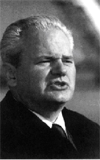 Slobodan Milosevic Slobodan Milosevic
|
 Marjana Markovic Marjana Markovic
|
Where are they now, the vainglorious, power-hungry men who strutted across the Balkan stage during the long nightmare of the 1990s, directing squads of paramilitary cut-throats or high-flying night bombers?
Abducted from his Belgrade redoubt, former Yugoslav President Slobodan Milosevic now awaits trial at the hands of the Hague (read "NATO") Tribunal. Mr. Milosevic fetched a hefty $1.3 billion, making him the first head of state to be privatized. The proceeds, only slightly less than the total recently promised by the G-7 leaders at Genoa in support of programs to combat AIDS, tuberculosis and malaria in the undeveloped world, were promptly assigned to reimburse a portion of the country's foreign debt.
General Wesley K. Clark (now retired) has fared somewhat better. After being embarrassingly dismissed as United States Commander in Chief, European Command (CINCEUR) in the aftermath of NATO's air bombardment of Serbia, he has joined the National Endowment for Democracy, the U.S. Government organization whose financial support and advice to the Yugoslav opposition were so crucial in bringing down his arch-adversary Mr. Milosevic.
The lengthy relationship between the two men, the devastation they wrought upon innocents, their mendacity and brutal single-mindedness, constitute the subtext of General Clark's egregiously self-serving memoir, and of journalist Slavolub Djukic's superficial and hasty deconstruction of Mr. Milosevic and his wife, Marjana Markovic.
Both books pander to a cruel fiction: that in the post-Cold War era, in the international political arena, there could exist any other motivating force than the "lust for power."
Mr. Milosevic had scaled the commanding heights of the Yugoslav League of Communists by playing upon bruised Serbian national sensibilities, betraying old comrades, and tolerating the ultra-nationalist militias that wrought havoc in Bosnia and Kosovo. The man who would bomb him into submission, General Clark, was a pure product of the United States Armed Forces, and had notably criticized its failure to prevail in Vietnam, where he¨taking a page from General Curtis LeMay¨would have "compelled the North Vietnamese to realize that its military efforts could not succeed." Clark, too, tolerated the hyper-nationalist Kosovo Liberation Army, an ethnic Albanian militia which would ultimately ethnically cleanse Yugoslavia's former southernmost province of most of its Serbian population.
Mr. Milosevic, in General Clark's words, was "wily and brutal," qualities that had brought him to the presidency of a country in the throes of violent dismemberment. General Clark, circling high above the fray like one of his beloved B-52s, had a taste for blasting and bombardiering, the kind of man the American Imperium prefers for command roles: gung-ho, bright, cynical, deadly.
Mr. Djukic's treatment of the president and his wife, produced during the last days of the Milosevic regime, produces unintended ironies. Discussing the fate of murdered Serbian oppositionist newsman Slavko Curuvija, Djukic notes that the victim "had sought protection with the regime, as was usual among even the most independent of journalists." With whom, one finds oneself wondering, had Slavoljub Djukic, likewise an oppositionist writer, sought protection? Neither Mr. Djukic nor his publishers provide an answer.
A Lust for Power offers slim insight into the careers and complexities of its two protagonists. Their modest backgrounds, their devotion to one another, their ability to manipulate situations and individuals to achieve their goals emerge as exceptional only in their banality. Single parties have historically provided the unscrupulous with the ideal organizational structure through which to rise to authority. Both are said to have demonstrated uncanny skills in devising ideological justifications¨he Serbian nationalism, she communism¨to conceal their single-minded pursuit of power. This is new in closed societies? Paradoxically, though the couple was surrounded by rampant corruption, little in Djukic's account suggests that either sought personal enrichment.
Djukic is on firmer ground when he sketches out the political and historical circumstances that shaped Mr. Milosevic's career, but does not link the extraordinary tale of the demolition of Yugoslavia with his ascent. To give the devil his due, the man who was called upon to defend the Serbian heart of the Federation faced a grave dilemma. With overt support from Bonn and the Vatican, Slovenia, the most prosperous of the country's republics, had not only seceded, but had gone on to thrive by selling arms to the breakaway statelets of Croatia and Bosnia-Herzegovina.
"Yugoslavia had been established seventy years earlier to promote the well-being of kindred peoples, and while Milosevic was hardly an innocent bystander, the Slovenes were ultimately responsible for the war," he writes.
Documenting malevolent use of the media in the conflict which had, with rapturous Western support, rapidly spread to Croatia and then Bosnia, Djukic asserts that "U.S. experts were hired to direct public opinion, and lies about the number of casualties, rapes, and persecutions attained monstrous levels." In contrast, Serbian propaganda, as befitted a single-party regime, was "so inept that even the truths it told appeared as lies."
In the negotiations leading up to the 1995 Dayton Accords that created the tripartite Bosnian pseudo-state, Slobodan Milosevic cut his losses with a cynicism that must have stunned even U.S. special envoy Richard Holbrooke, hardly a man to be easily surprised: "They [the Bosnian Serbs] aren't my friends," he famously uttered. "They're shit."
Small wonder that Radovan Karadzic is said to be willing to testify against his former boss should he appear at the Hague.
Ultimately, though, it was Kosovo, not Slovenia, that set in motion the collapse of Yugoslavia. Though the Serbs believed Kosovo to be the birthplace of their nation, the province's majority Albanian population have always thought otherwise. Fellow-feelings for their ethnic brethren in Albania were traditionally strong, and found brief fulfillment during World War II, when a pro-Axis Greater Albanian state, boasting its own SS division, came into ephemeral existence.
After a decade of passive resistance touched off by Mr. Milosevic's challenge to the Kosovar Albanians in 1989, the leadership of the Kosovo resistance passed in the late '90s into the hands of sterner men. The genesis of the KLA can be traced, however, to Ms. Madeleine Albright's appointment as American Secretary of State. Within months, a well-armed, disciplined guerrilla force had been established, and begun operations. The shift was tactical, not strategic. As early as 1995, politicians in Pristina were calling for NATO intervention as the only solution to Serbian domination. Now a way had been found to bring about such an intervention. NATO was only too happy to oblige.
Judging Serbia's grip on Kosovo to be at risk, Mr. Milosevic intervened with full force, rapidly pushing back the outmanned and outgunned KLA. It was at this moment that the lives and careers of the Yugoslav President and General Clark were to intersect in the final battle. It was a battle Milosevic could not be allowed to win, and that Clark could not afford to lose.
Under threat of NATO bombing in the fall of 1998, the Serbs agreed to a cease-fire and the dispatch of Western "unarmed verifiers" to monitor compliance. Neither Djukic nor General Clark identify these "verifiers." But it is known that most were employees of Military Professional Resources Inc., a military consulting firm based in Langley Virginia operating under contract to the United States Armed Forces, as they had earlier in Croatia. There they had helped plan Operation Storm, the blitzkrieg attack that drove 200,000 Serbs from Krajina in May 1995, relieving Croatia overnight of its Serbian minority. With this kind of assistance, the KLA quickly regrouped. Not surprisingly, the Serbs counterattacked: "from the Serb perspective, the buildup of [Serb] forces [in Kosovo] made perfect sense," Clark admits.
While allegations of ethnic cleansing filled the Western media, President Milosevic gave the KLA five days at the most.
Less in response to a humanitarian catastrophe, than to protect local assets, the decision to bomb Yugoslavia was, according to General Clark, "a purely American plan." In fact, though the official pretext would be protection of the threatened Kosovar Albanians, the real reason for the bombing campaign lay elsewhere. Writes Clark: "NATO's credibility was on the line."
If the Serbs "didn't accept the proposed agreement [for partition of Kosovo] and the NATO-led force along with it, then they would be hit by NATO airstrikes." This was the bargaining position brought by the allies to the Rambouillet Conference. "I wanted a rock 'em-sock 'em capability to go after high-value targets," in Clark's words.
The outcome of Rambouillet was a forgone conclusion. President Milosevic's representatives rejected a NATO ultimatum that would have transformed all of Serbia into occupied territory. The KLA leadership, after a display of pique¨they wanted more¨signed on. Secretary Albright and General Clark would have their war. It was to be "the American way of war: strategic, heavy firepower."
As the bombs began to fall and the missiles to impact, Serbian forces on the ground went to work. Refugees streamed out of Kosovo: they were plausibly fleeing the dreaded Serb paramilitaries, people like Arkan's Tigers, not to mention regular police forces; they may equally plausibly have been responding to pressure from the KLA, which was murdering those it considered "collaborators" while it called on the Kosovar Albanian population to forsake their homes.
General Clark, candid to a fault, admits that in the early days of the bombing, NATO had no clear objectives. Was it to halt Serb repression? Bring the Serbs back to the table at Rambouillet? Destruction of the Serb military? "...A number of us had begun to ask in private about the political goal of the campaign." As the war dragged on and Serbia failed to surrender as predicted, and as NATO bombs continued to miss their targets, consternation gripped the alliance. An unnamed European Union ambassador confided in late May to General Clark that there was "a declining interest in the Serbs' crimes."
Not to fear, a remedy was close at hand. "On Tuesday, May 25, we began to hear rumors that Milosevic was to be indicted by the International Criminal Tribunal." Shortly thereafter, General Clark was contacted by ICT prosecutor and later Canadian Supreme Court justice Louise Arbour, who came brandishing a sealed indictment.
The rest, as they say, is history. Clark leaves no doubt about the real reasons for the bombing campaign. "This conflict about Kosovo became a test of NATO's role in post-Cold War Europe. NATO itself was at risk of irrelevance or simply falling apart following a defeat..."
There is a footnote to this cautionary tale: The removal from power of Mr. Milosevic has hardly stopped the creeping disintegration of the successor states of the former Yugoslavia. Tiny Macedonia, a Yugoslavia-in-miniature with an uneasy mix of ethnic groups and religions, is now being torn apart by a well-armed Albanian force calling itself KLA. These fighters, described in the Western media as "insurgents" or "rebels," have been identified by the Macedonian government as terrorists. Despite their disclaimers, they seek to create the conditions for a Greater Albania.
They are in fact veterans of the Kosovo Liberation Army, latterly the Kosovo Protection Force, trained and armed by MPRI. And, as in the Kosovo war, they are receiving political support from the U.S.-NATO alliance.
Lusting for power, anyone? ˛
Fred A. Reed is the author of Salonica Terminus: Travels into the Balkan Nightmare. Talonbooks, 1996, and Anatolia Junction: a Journey into Hidden Turkey, Talonbooks, 1999.